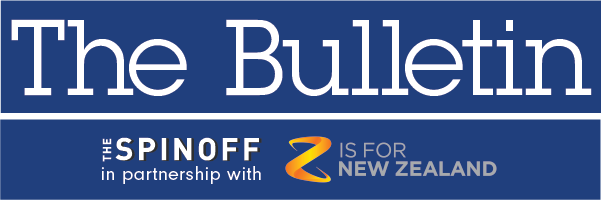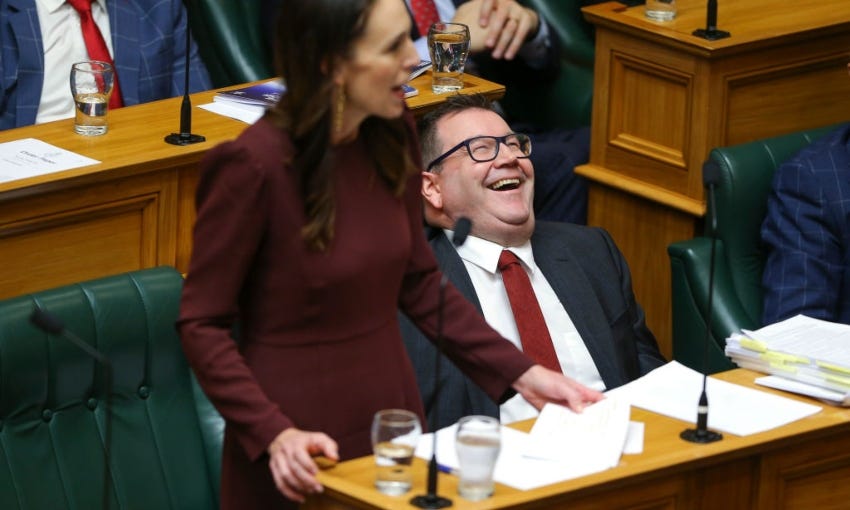Ten key reads on the budget
You're not going to be able to process every story out of the budget, so here's ten pieces that give a flavour
Good morning and welcome to The Bulletin for Friday 21 May, by Alex Braae for The Spinoff. Presented in partnership with Z Energy.
In today’s edition: Ten key reads on the budget, Ports of Auckland CEO quits, and Kawerau facing devastating job losses if mill closes.
Image: Grant Robertson enjoying the PM’s speech about his budget (Hagen Hopkins/Getty Images)
For today's Bulletin budget special, I'm going to try and make everything a bit easier to read. There's obviously quite a bit of information to unpack, and there's absolutely no chance any one person can take it all in. So instead, there'll be a whole lot of short links out to key pieces, that give a sense of both the overall picture, and of specialist areas that got some cash, or didn't. A warning – this will not be a complete list of absolutely everything that mattered.
For the main story of it all, I'd encourage you to catch up on our live updates, and also read Justin Giovannetti's report on the top-line bit of spending – a boost for benefits that will certainly increase the money going towards those in extreme hardship, but won't necessarily deliver the sorts of system changes that anti-poverty activists have been calling for – that criticism is covered in this story on the NZ Herald.
So without further ado, here are ten good reads about the budget, what has been promised, and what it all means.
1) A round-table of hot takes
If you just want to read short summaries from sector experts about their field, look no further: The Spinoff has once again gathered them up and put them in one place. For my money, there was some excellent analysis from Māori economic development expert Joshua Hitchcock about how the annual targeted spending will do little to reduce inequality, and economist Dr Eric Crampton on reforms to the emissions trading scheme that will ring-fence revenue that could make it a lot easier to achieve net-zero emissions.
2) Danyl Mclauchlan on bringing it all together
A persistent and fair criticism of this government over its tenure has been a lack of joined-up thinking, and how some policy decisions have felt incoherent with their wider sense of mission. Mclauchlan argues that this budget caps off an effort to link poverty, low wages, productivity concerns, housing and migration, and in a best-case scenario could result in that long-promised transformational change.
3) Millions to take control of local water
One of the government's biggest (and potentially most controversial) reforms is the creation of new regional entities to take control of water infrastructure. Newsroom's Jonathan Milne has looked at the $296 million allocated to this project, along with a few other bits of infrastructure spending.
4) What do the scientists say?
The wonderful people at the Science Media Centre have collected reaction to various announcements, including a massive redevelopment of Scott Base, health spending, and climate spending. I'm not going to try and summarise each point, but one up the top caught my eye – associate professor Nicola Gaston, who said the government was both giving and taking from crucial research sectors. To quote:
"What I am saddened by, reading through the tabulated numbers, is much less dramatic: the Endeavour Fund, cut on the order of 10%; the Health Research Fund, similarly cut; the Marsden Fund, cut in real dollars after inflation. These are not nice to haves, these are the bread and butter of our research sector, and anything other than an increase in line with inflation is rather a slap in the face.”
5) What has and hasn't changed in tax
Writing on Interest, tax expert Terry Baucher has noted a range of points of interest for the tax system. It's certainly a bit of a pointy read, but it gets into the nuts and bolts of how the revenue generating system actually works.
6) Pharmac budget increases, but advocates say not enough
One of the trickiest areas of health spending is how much Pharmac has to spend, and how that gets allocated on what medicines. A fresh $200 million has been put in, which health minister Andrew Little says will help "around 370,000" patients a year. But as One News reports, advocates say that will still leave plenty lacking cover and in need.
7) Let's Get Wellington moving looking risky
The massive Wellington transport programme is looking likely to go way over budget, and as the NZ Herald's Georgina Campbell reports, some projects could end up being either axed or scaled back. Part of what Treasury is so concerned about is that local governments have so many other competing spending priorities.
8) Choo bloody choo
If you were wondering, that's the sound of a big investment in rail. Newsroom's Ben Leonard reports that'll be directed both at upgrades to the national network, but also towards the revitalisation of the Hillside manufacturing facility in Dunedin. That is a symbolically significant move, because Hillside's loss of a major Kiwirail contract almost a decade ago became a potent symbol of the loss of manufacturing jobs in New Zealand.
9) Finding political balance, not economic balance
Economist Rosie Collins writes on The Spinoff that the lift in benefits indicates that there is little appetite for the politics of austerity from the government. However, she wonders whether the country would have been better served economically by the government going further – if it wasn't so concerned about the risk of looking politically irresponsible. On the point about going further, Bernard Hickey is worth reading on whether the government can afford to take on much more debt to pay for spending and investment – in his view, it absolutely can.
And 10) Ruth Richardson fires back
Much of the rhetoric from Robertson concerned the 30th anniversary of the "Mother of all Budgets" – the 1991 document delivered by Ruth Richardson which many argue was a wholehearted embrace of austerity. Stuff's Thomas Coughlan (again) called Richardson up to get her take on that. She defended the legacy of 1991, and said Robertson's attack was a “predictable cheap shot, further reinforcing my point that the budget expenditure choices are driven more by politics than economics”.
Right, that's enough reading to get started with. But just warning you now, there's going to more on the budget down-page, and probably next week too. In other news:
Ports of Auckland CEO Tony Gibson has resigned, after an embattled period in charge. Stuff reports he made his decision in part because of what he described as “persistent and sometimes personal attacks”. That is perhaps a reference to anger from unions over the deaths of several workers, and a subsequent damning health and safety review. The statement from Gibson did not acknowledge said deaths. Another story of note: Stuff's Todd Niall reports the difficult and delayed automation project has stalled yet further, and now won't start until at least August, if not later.
About 170 jobs could be at risk if the mill in Kawerau closes down, in what would be a devastating blow for the town and the region. The most detailed story on it comes from Brent Melville at (paywalled) Business Desk, with consultation currently underway between management and employees. The mill is seen as a crucial link in making forests economically viable and worthwhile – it's one thing to be growing heaps of trees, but if everything is processed overseas very little income makes it into the community. I went to Kawerau earlier in the year to get a sense of how the town is faring, and it is a place currently experiencing both a growing population and growing inequality.
Our members' contributions provide jobs and hope to all the journalists, editors, designers, podcasters and freelancers who make The Spinoff every day. If you enjoy what we do and want to help us do more, please donate today.
Sort of a budget story which wasn't included up the page: The government is planning a social insurance scheme for those who lose jobs. Justin Giovannetti reports it is still in the early design stages, so won't be in place for a few years yet, but effectively it would mean those who lose jobs have a period of receiving a large share of their former income while they look for a new job. It's not a long way away from the "good dole" approach taken during Covid, which was praised for helping people through a major economic shock, but also criticised for creating a two-tier welfare system. The Child Poverty Action Group warned in a briefing to government that it could bake in inequality, and heighten an "us vs them" mentality towards beneficiaries. Business NZ and the Council of Trade Unions are both involved in the scheme's design.
One reason budgets get presented at lockups is because it allows journalists and economists to properly digest market sensitive information. Then, when the budget gets read at 2pm, the markets tend to move. And yesterday, Business Desk's (paywalled) Dan Brunskill reported that the NZX reacted positively to the budget. One potential reason for that given by an economist quoted in the story is that money directed towards beneficiaries very quickly flows through to the wider economy, which has an overall stimulating effect.
Following up a few pieces of news from earlier in the week: Stuff's Joel Macmanus reports bus drivers in Wellington rejected the pay offer that would have involved selling future conditions for an upfront cash payment, and are now preparing a new round of strikes. The ransom cyber attack on the Waikato DHB has resulted in a payroll glitch, leaving some staff hundreds of dollars underpaid, reports Newshub. And the NZ Herald's Anna Leask reports the victims of the stabbing attack in Dunedin are starting to recover, with one of them thanking bystanders who intervened.
Got some feedback about The Bulletin, or anything in the news?
Drop us a line at thebulletin@thespinoff.co.nz
Right now on The Spinoff: Michael Andrew speaks to a few experts who say the government could have gone further with the budget. Toby Manhire ranks the greatest political scandals this country has ever seen that involve the Koru Lounge. Charlotte Muru-Lanning introduces a new Doc Edge short, called Koro’s Hāngi, which is about the cooking practice and the way it represents wider Māori concepts. Lofa Totua writes about Teine Sā, a new Pasifika horror TV anthology which looks scary as hell. And we've taken an excerpt from Michelle Langstone's magnificent new book of essays, about grief and love. This particular piece is about a stage of the IVF journey for two people who are going to be fantastic parents.
For a feature today, a piece about who picks up the phone if you call a massive company like Apple or Facebook. Rest of World has reported on the staffing policies used by Teleperformance, a company that you probably haven't heard of but might have had to deal with at some stage. The story starts with an examination of the conditions at call centres in Greece, and the heavy use of precarious migrant labour. Here's an excerpt:
Teleperformance lures workers to Greece from nearby countries, such as Morocco, Algeria, Tunisia, and Turkey, with generous welcome packages, which include plane tickets, two weeks in a hotel, and assistance finding permanent housing. But workers said they are often asked to sign contracts as short as one or two months in length. Five current and former Teleperformance employees told Rest of World the arrangement left them no choice but to accept ruthless productivity quotas and frequent harassment from managers — or risk being terminated and, eventually, deported. “I couldn’t say anything because I was afraid to get fired,” Aylin says. “I came here; I moved my life here; I won’t go back to Turkey; we don’t have any chance.”
Teleperformance did not respond to multiple detailed requests for comment from Rest of World about the allegations made in this story. We also reached out to Apple, Sony, Microsoft, Facebook, and Netflix for comment. All declined to comment on the record or did not respond.
Experts say that poor working conditions are a hallmark of the global call center industry, which employs millions worldwide to help multinational businesses cut costs. Subra Ananthram, an international business professor at Curtin University in Australia, has studied the industry for years. He told Rest of World that in India, the U.K., and the Philippines, jobs in call centers are characterized by repetitive tasks, limited breaks, high-pressure situations, high turnover, and substandard conditions.
In sport, a tremendous event looms in Wellington: The Phoenix will be returning to play their first proper home game in more than a year. It'll be against Western United, coached by former gaffer Mark Rudan, who's not exactly popular among Phoenix fans, so that could add a bit of bite. Currently the Phoenix are sitting on the edge of playoff contention, and realistically need to get on a solid winning streak to make it from here. But there seems to be a real buoyancy about the Phoenix at the moment, with a crop of key players already signed on for next season, including revelatory teenage striker Ben Waine. Later this morning I'll be getting on a bus down to the capital for tomorrow's game – can't wait.
That's it for The Bulletin. If you want to support the work we do at The Spinoff, please check out our membership programme.







